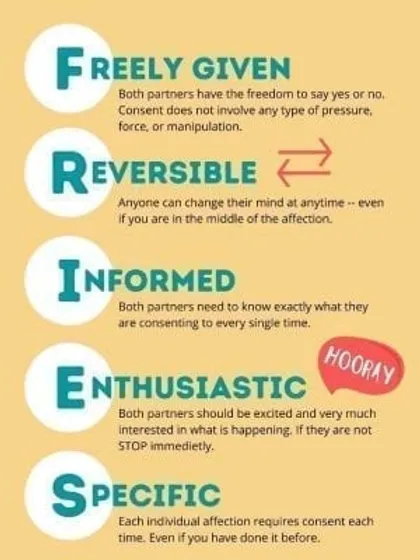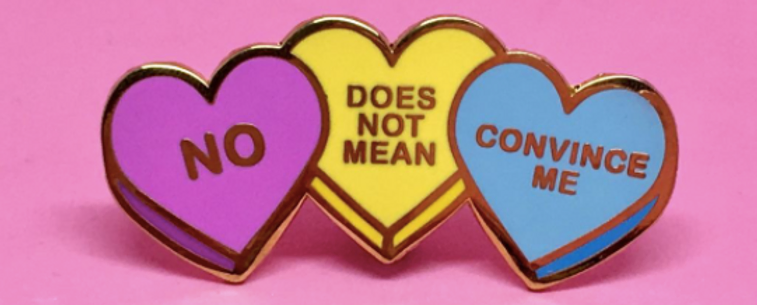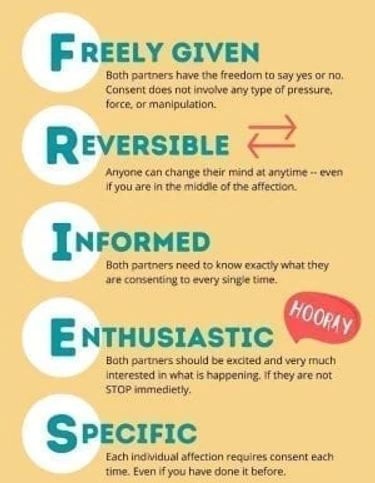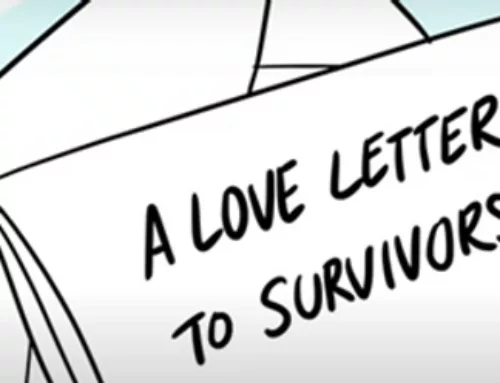We’re talking specifically about sexual consent given that May is sexual violence awareness month. This one word can really have a lot packed into it and many people express confusion or misunderstandings around consent. But there are many ways to make it easier and simpler to understand.
You’ll often hear people talking about enthusiastic and informed consent. What are they talking about? We like to refer to the FRIES acronym because it’s easy to remember and easy to explain:

Freely Given: all partners have the freedom to say yes or no. There is no pressure, force, or manipulation.
Reversible: anyone can change their mind at anytime and ask to stop even if you’re in the middle of sexual act.
Informed: all partners need to know exactly what they are consenting to every single time.
Enthusiastic: all partners should be excited & engaged in what is happening. If they’re not, STOP immediately.
Specific: each act requires consent each time, even if you’ve done it before.
Now some of you are asking, how do you do this when you’re in the moment and everything is going so well and you don’t want to make it all clinical? Never fear, there are easy ways to have a consent conversation that can be comfortable and incorporated into what you’re doing. You may have to change some of your thinking around this because sometimes we learn unhealthy things from TV and movies. But it really is important to focus on consent that is FRIES because it ensures that you and your partner are enjoying things rather than someone feeling uncomfortable, powerless, or violated.
1. Figure out if there’s really mutual interest before even considering sexual activity
- If you’re flirting with someone, are they giving me eye contact, leaning in, expressing excitement?
- Are you on the same page? (For example, are you looking for a relationship, but they’re looking for a casual hook-up?)
- And if they’re not into what you’re into and they aren’t giving you clear ‘go ahead’ signals, don’t try to pressure them or ‘talk them into it’. They’re either into it or they’re not and if they’ve said no, accept the no.

2. Negotiate consent verbally
- Be explicit in asking for what you want
This can feel a little uncomfortable at first. It can make you vulnerable to ask for what you want and have someone say, ‘no’. But being clear removes all of the guessing games out and ensures that you aren’t crossing anyone’s boundaries. And it can even be sexy to be able to talk about what is on the table as well as what’s not.
3. Negotiate consent non-verbally
- Practice reading your partner’s body language in non-sexual settings and check in with them to make sure you are reading them correctly.
- Understand that non-verbal cues can indicate “no” or a withdrawal of consent (if they are pulling away, turning away, or stiffening up, they are not into it and just stop!)
- Understanding your partner’s non-verbal cues might help you to come to a point in your relationship where you and your partner agree on an ‘only no means no’ approach to consent. This is when your partner permits you to touch their body in any way within pre-established boundaries unless they explicitly say “no”. Until then, focus on only yes meaning yes. And a maybe is not a yes.

4. Encourage your partner to communicate with you
- Check in with your partner during sex and ask if you can do x or y. Ask them if what you’re doing is ok. And if they’re not responding, what are their non verbal cues telling you? Are they stiffening up or seem to be ‘letting you’ rather than fully participating? Then please stop and check in.
- Check-in with your partner after sexual acts have been engaged in. Asking how they’re doing or feeling or whether they enjoyed things or would like to do those things again is helpful to encourage your partner to speak up and ensure that consent is meeting the FRIES definition we talked about earlier.
5. Be aware of boundaries and err on the side of caution
- Avoid partners who are impaired and can’t knowingly consent. If they’re drunk or high or on some medication that impairs their ability to make decisions for themselves, don’t take advantage of them or the situation. It’s a crap move and could be construed as assault. Sometimes it can be tempting in the moment but it’s not worth hurting someone and potentially hurting yourself. Just don’t do it.
- If a partner has been assaulted or has experienced having their consent violated or coerced in the past, try to make it comfortable for them to talk about what might cause them to freeze or fawn or distress them in other ways.
- You won’t ruin the mood by checking in, but you will absolutely ruin any mood if you cross someone’s boundaries!
Remember, consent is as easy as FRIES! If consent is not freely given, reversible, informed, enthusiastic, and specific, then it is not consent. We love this booklet put out by SACE on consent that helps further explain consent if you’re still having trouble. Or check out this 3.5 minute video done by the students at Western.
If you’ve been sexually assaulted or have had your sexual consent violated and are not sure who to talk to or what to do, reach out to the local sexual assault centres in Alberta:
Association of Alberta Sexual Assault Services: Alberta 1 Line (9 am to 9 pm)
call or text: 1-866-403-8000 or
visit their website: IBelieveYou.info


